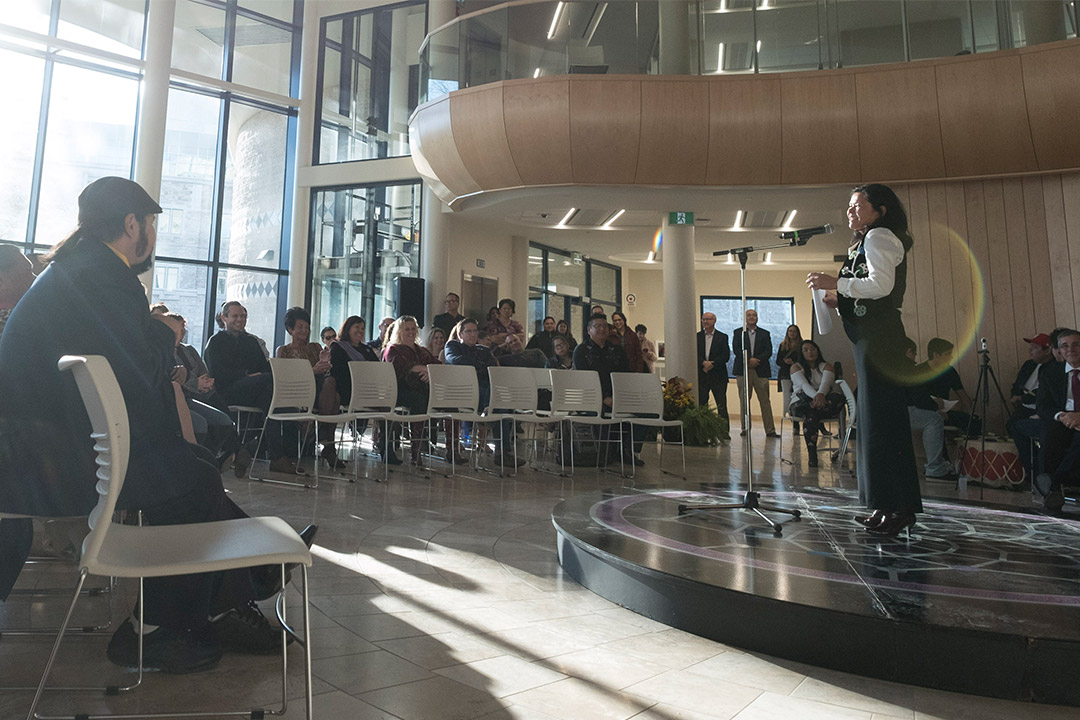
Ottmann optimistic about Indigenization
With a father who served as chief of her Fishing Lake First Nation for three decades and a mother who has driven school buses for 45 years, it’s easy for Jacqueline Ottmann to credit her parents for setting a healthy foundation of leadership, integrity and education in her life.
By HenryTye GlazebrookWhat she never expected, however, was how these strong character traits would still leave her wanting more—wanting to enact real, structural, systemic change in her environment.
“What I realized was that there was a paucity of authentic, engaging, meaningful Indigenous content within our schools, and that includes our universities,” said Ottmann, who became the University of Saskatchewan’s first ever vice-provost, Indigenous engagement, on Oct. 1. “If you don’t have those voices and that meaningful content, then I think we’re doing a disservice to society.”
Ottmann, who is Anishinaabe (Saulteaux), came to the U of S from the University of Calgary’s Werklund School of Education, where she was the director of Indigenous education initiatives, an associate professor and co-chair of U of C Indigenous strategy.
Ottmann said the new role with the U of S was an opportunity not only to return to the campus where she completed her graduate and PhD programs, but also a chance to help shape her alma mater as it places more and more emphasis on the importance of reconciliation, Indigenization and community collaboration.
“I really feel that this position does send a message to Indigenous communities—not only within Saskatchewan but across the nation and indeed internationally,” she said. “Indigenization is important to the U of S, and the university is being responsive to the Truth and Reconciliation Calls to Action and is respectful of the United Nations’ Declaration on the Rights of Indigenous People.
“That is a very strong stance, and I think this position will help to affirm and solidify that important message for Indigenous people.”
Ottmann said she looks forward to working with U of S senior leadership to discuss initiatives for the campus as a whole as well as collaborating with individual colleges and departments, and that diving into her new position in the midst of the university planning process offers a unique opportunity to ensure Indigenous voices and perspectives are fully acknowledged.
“If Indigenization is identified as one of the four strategic commitments, then it makes sense that there be an Indigenous person at the senior level to help inform, educate and speak to relevant issues and help plan meaningful and authentic policies that affect not only Indigenous faculty, students and staff on campus, but the whole student and community body,” she said.
But even more important, Ottmann emphasized, are the new dreams and aspirations that she hopes having a person like herself in a position of such prominence might ignite in Indigenous youth.
“Now that I’m in this position, my nieces and nephews, my children—everyone that I come into contact with—will know the role and responsibilities of a vice-provost,” she said. “It opens the door, in essence, for Indigenous students to aspire to these positions. I think that’s very exciting. If we have Indigenous students aspire to these positions, then again I think we’re working toward a stronger university and society in general. What’s good for Indigenous people is good for all people.”
HenryTye Glazebrook is a freelance writer and former U of S communications co-ordinator.

